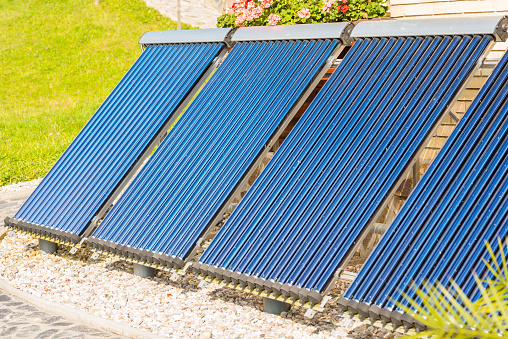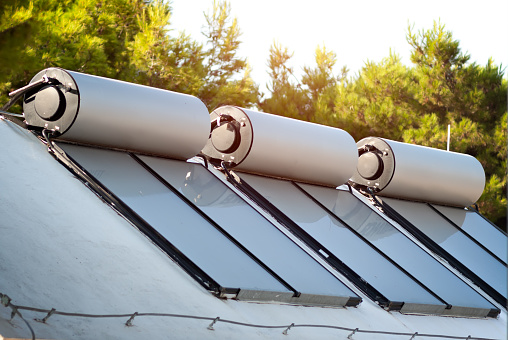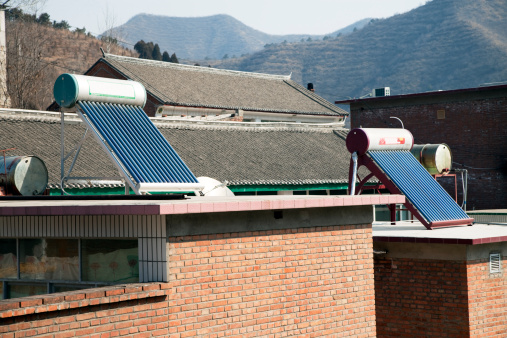
Hey there, solar power water heater enthusiasts!
Today we’re going to talk about one of the best ways to harness the energy of the sun for your home: a solar power water heater.
This technology is becoming increasingly popular among homeowners who want to reduce their carbon footprint while also saving money on energy bills.
If you’ve been considering making the switch to renewable energy sources, a solar power water heater is an excellent place to start.
With this system in place, you can heat your household’s water supply using only the power of the sun – no electricity or gas required.
Not only will this help lower your environmental impact and save you money over time, but it’ll also provide you with reliable hot water all year round.
So let’s dive into what makes these systems tick and why they might be the right choice for your home!
How Solar Water Heaters Work
Solar water heaters are a great way to save money on your energy bill while also reducing your carbon footprint. These systems work by using the sun’s energy to heat up water that can then be used for bathing, washing dishes, and other household tasks.
The process starts with solar collectors, which are installed on your roof or nearby area where they will receive direct sunlight. These collectors contain tubes filled with a special fluid that absorbs the sun’s rays and transfers that heat to the water in your storage tank.
As the hot water rises to the top of the tank, it is replaced by cooler water from below, creating a natural circulation system that keeps fresh warm water available throughout the day.
By harnessing this free source of renewable energy, you can enjoy all the benefits of hot water without having to rely solely on traditional electricity or gas power sources.
This technology has many advantages over conventional methods of heating water as it helps reduce greenhouse gases emissions and saves natural resources like fossil fuels.
Additionally, homeowners who invest in solar-powered systems may qualify for tax credits or other incentives offered by their local government or utility company.
In order to learn more about these benefits and how you can start enjoying them yourself, keep reading!
Benefits Of Using Solar Power For Water Heating

Now that we’ve covered the basics of how solar water heaters work, you may be wondering if they’re really worth it. After all, traditional gas or electric water heaters seem to do the job just fine, right?
While this is true, there are a number of benefits associated with using solar power for water heating.
First and foremost, solar energy is completely free! Once you have your system installed, you won’t need to pay a dime for fuel or electricity to keep your water heated.
Additionally, switching to a solar water heater can greatly reduce your carbon footprint and help protect the environment.
Plus, many states offer tax incentives or rebates for homeowners who make the switch – so not only will you be saving money in the long run, but you may also receive some financial assistance up front.
In the next section, we’ll take a closer look at the different types of solar water heaters available on the market today.
Types Of Solar Water Heaters
When it comes to solar water heaters, there are several types available in the market. Each type has its own benefits and drawbacks depending on your needs and budget.
- Passive Systems: These systems use natural circulation or gravity to move water through the system, making them simpler and cheaper to install but less efficient than active systems.
- Active Systems: These systems have pumps that circulate water through the collectors and storage tank, resulting in higher efficiency but more complexity and cost.
- Integral Collector Storage (ICS) System: This is a compact system where the collector and storage tank are combined into one unit, making it ideal for small households with low hot water demands.
Before choosing a particular type of solar water heater, consider factors such as climate, hot water usage patterns, available space, and local regulations. A professional installer can help you determine which type would work best for you.
Moving forward with installation and maintenance tips…
Installation And Maintenance Tips

As we discussed in the previous section, there are different types of solar water heaters available in the market. Now that you have chosen the type that best suits your needs, it’s time to talk about installation and maintenance tips.
Firstly, before installing a solar water heater, make sure that your roof is strong enough to support its weight. Also, ensure that there’s no shading on the area where you plan to install it because even a small amount of shade can reduce the efficiency of your system significantly.
Once installed, regular maintenance is crucial for optimal performance. Experts recommend checking the pipes and connections every 3-5 years for any leaks or damage.
Another essential tip is to clean the panels regularly from dust and debris as they can block sunlight absorption. Depending on where you live and how dusty it gets, cleaning twice a year should suffice.
Lastly, if you notice any decrease in hot water supply or unusual noise coming from your system, call an expert immediately rather than trying DIY fixes which may cause more harm than good.
Remember these simple installation and maintenance tips to enjoy long-term savings on energy bills while doing your part towards reducing carbon footprint!
Conclusion
In conclusion, as a solar power water heater expert, I highly recommend switching to this technology.
Imagine waking up on a chilly morning and stepping into a hot shower that was heated by the sun’s rays – it’s an experience like no other.
Not only will you be reducing your carbon footprint and saving money in the long run, but you’ll also be contributing to a cleaner and greener future.
Maintenance is easy with these heaters; all you need to do is keep them clean and free of debris.
With proper installation and care, they can last for decades without any major repairs needed.
So why not make the switch today?
Enjoy warm water while knowing that you’re doing your part in preserving our planet.

